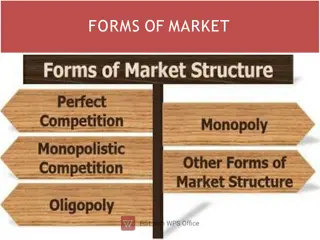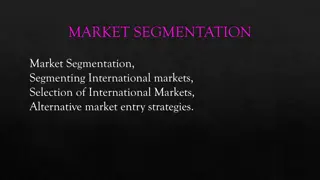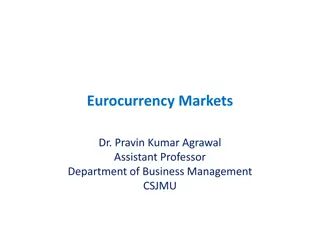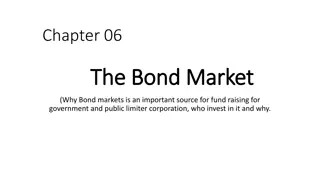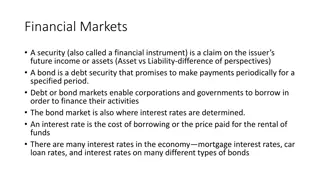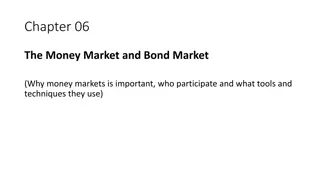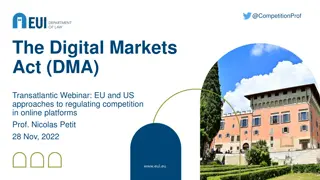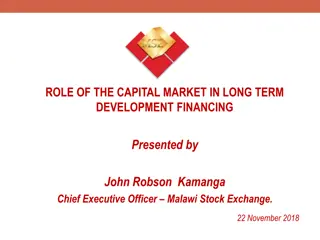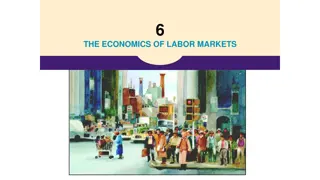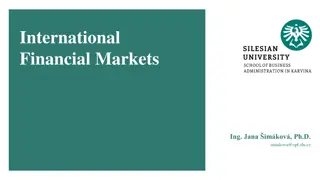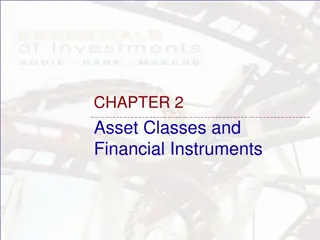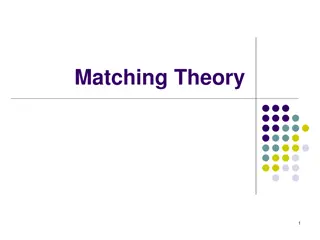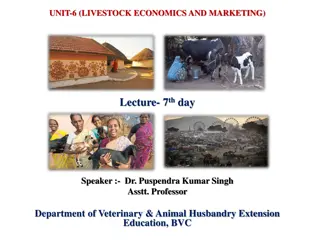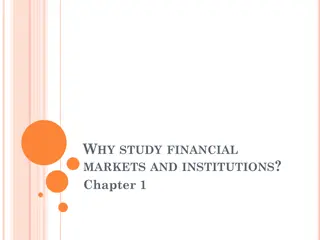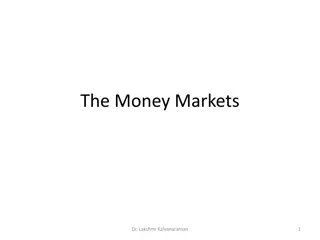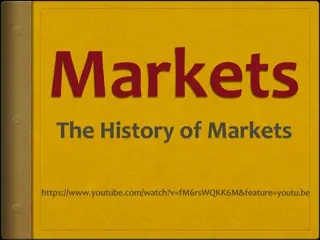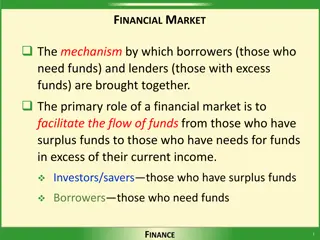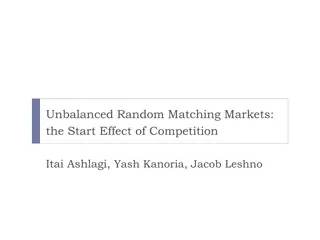Understanding Financial Markets in India
Financial markets play a crucial role in connecting lenders and borrowers, providing avenues for investment and capital generation. In India, the financial system includes money markets and capital markets, offering diverse financial products and opportunities for investors. Money markets deal with
2 views • 106 slides
Harnessing Carbon Markets for Sustainable Development in Pakistan
Understanding the significance of carbon markets, this content delves into the interplay between economic growth and environmental sustainability, emphasizing the urgency to limit unsustainable practices. It explores mechanisms such as carbon pricing and cap-and-trade systems in the context of clima
0 views • 17 slides
Empowering New Hampshire's Electricity Market Through Community Power
Empowerment of the electricity market in New Hampshire is highlighted through community power initiatives that aim to redesign governance, promote competitive retail markets, and enhance the role of distributed energy resources. The RSA 374:F of 1996 underlines the importance of competitive markets
4 views • 13 slides
Understanding Perfect Competition in Markets
Perfect competition in markets involves a large number of buyers and sellers dealing with identical products, leading to firms being price takers. This form of market structure allows for freedom of entry and exit, perfect knowledge of prices and technology, and homogeneous products. Sellers cannot
0 views • 17 slides
Artificial Markets in Software Development: A New Paradigm
Explore the innovative concept of utilizing artificial markets for software development, where constructively egoistic agents interact in problem-solving domains. Learn how artificial markets can lead to the development of advanced algorithms and valuable knowledge, revolutionizing traditional softw
0 views • 14 slides
Unlocking International Markets: Segmentation and Entry Strategies
Market segmentation plays a vital role in targeting international markets effectively. By segmenting customers based on various criteria, businesses can tailor their strategies to different market segments. This allows for the selection of the most suitable international markets and the implementati
0 views • 25 slides
Understanding Markets and Economic Structures
Markets play a crucial role in bringing buyers and sellers together for transactions. This article discusses the concept of markets, different types of markets in a capitalist economy, focusing on perfect competition. It outlines the features and conditions of perfect competition, emphasizing the im
2 views • 42 slides
Understanding Eurocurrency Markets: A Comprehensive Overview
Eurocurrency markets facilitate the deposit and loan of currencies outside their country of origin. This includes Eurodollars, Eurosterlings, and other freely convertible currencies. These markets involve banks worldwide and play a key role in international trade and capital flow. Eurobanks are majo
0 views • 27 slides
Understanding the Significance of the Bond Market for Government and Corporations
The bond market serves as a crucial source for fundraising for governments and public corporations. Investors use money markets for short-term needs and capital markets for long-term investments to manage risks. Various types of bonds are available, including Treasury notes and bonds, agency bonds,
0 views • 20 slides
Overview of Financial Markets and Their Impact on the Economy
Financial markets encompass various segments like the bond market, stock market, and foreign exchange market, each playing a vital role in the economy. Bond markets facilitate borrowing for corporations and governments, while interest rates influence investments and savings. The stock market allows
0 views • 21 slides
Revised Approach for Distributed Energy Resource Aggregations in Wholesale Markets
Revised market design approach to comply with Order No. 2222 requires ISOs/RTOs to allow distributed energy resources to provide wholesale services. The focus is on areas like Energy and Ancillary Services Markets Participation, Metering and Telemetry Requirements, DERA Registration Coordination, an
0 views • 103 slides
Understanding Financial Economics and Its Importance in Markets
Financial economics is a branch of economics focused on the distribution of resources in uncertain markets. It involves making decisions considering future events and creating models to analyze variables affecting decisions. Key aspects include working out portfolio risks and utilizing financial ins
0 views • 129 slides
Understanding Perfect Competition in Markets
Students will learn about the characteristics of perfectly competitive markets, including the concept of perfect competition, commodities, and barriers to entry. The lesson covers the conditions of a perfectly competitive market and examples of markets that fit this structure, such as fruits and veg
0 views • 17 slides
Understanding the Importance of Money Markets and Bond Markets
Money markets play a crucial role in the financial system by providing short-term, low-risk, and liquid investment options. Participants include institutional investors and dealers who engage in large transactions. Money market securities have specific characteristics, such as large denominations, l
0 views • 23 slides
Analysis of EU and US Approaches to Regulating Competition in Online Platforms
This webinar delves into the Digital Markets Act (DMA) and its implications for competition regulation in online platforms in both the EU and US. Prof. Nicolas Petit discusses the key principles and provisions of the DMA, shedding light on its impact on digital markets. The DMA targets core platform
0 views • 10 slides
Role of the Capital Market in Long-Term Development Financing
The presentation by John Robson Kamanga, CEO of Malawi Stock Exchange, delves into the role of capital markets in financing long-term development. Topics covered include defining capital markets, functions of stock exchanges, development finance, areas funded by development finance, the capital mark
0 views • 23 slides
Economics of Labor Markets: Factors of Production and Labor Demand
The Economics of Labor Markets explores the markets for factors of production such as labor, land, and capital. Demand for these factors is derived from firms' decisions to produce goods. The labor market, governed by supply and demand forces, exhibits diminishing marginal product of labor due to fi
0 views • 41 slides
Understanding International Financial Markets: Key Insights and Considerations
International Financial Markets play a crucial role for Multinational Corporations (MNCs) in accessing foreign exchange, money, credit, bond, and stock markets. MNCs leverage the international money market for various purposes like borrowing short-term funds in foreign currencies and investing for h
0 views • 25 slides
Understanding Financial Instruments and Markets
Explore asset classes like fixed income securities, money market instruments, and capital market instruments. Learn about different financial instruments in various markets including money market, bond market, equity markets, and derivative markets. Dive into money market instruments like Treasury b
0 views • 47 slides
Broadband Infrastructure in the ASEAN Region: Markets, Missing Links, and Policy Options
This report by Terabit Consulting delves into the broadband infrastructure landscape in the ASEAN region, focusing on nine member countries. It covers various aspects such as telecommunications markets, network connectivity, pricing, and international bandwidth, aiming to identify missing links and
0 views • 40 slides
Central European Steel Markets Regional Meeting 2017 at Courtyard by Marriott Warsaw Airport Hotel
The Central European Steel Markets Regional Meeting 2017 took place at Courtyard by Marriott Warsaw Airport Hotel. Key presentations on steel markets and trends were delivered by industry experts. The event included discussions on industrial competitiveness, steel production, market challenges, and
0 views • 4 slides
Understanding Matching Theory in Two-Sided Markets
Matching theory explores the dynamics of two-sided markets where participants on both sides seek suitable matches without using money. Examples include marriage markets, medical residencies, school choice programs, and more. We delve into the marriage model, stable matching criteria, and the deferre
0 views • 28 slides
Understanding Efficient Markets Hypothesis in Corporate Finance
Explore the concepts of efficient markets hypothesis (EMH) and adaptive markets hypothesis (AMH) in corporate finance. EMH posits that all information is instantly reflected in stock prices, while AMH suggests a gradual process based on the number of analysts. Learn about different forms of market e
0 views • 33 slides
Livestock Economics and Marketing: Understanding Markets and Classification
Livestock markets are essential for the buying and selling of livestock and related products. Markets can be classified based on various factors such as location, nature of commodities, time span, and more. Understanding the essentials of markets, livestock market components, and classification help
0 views • 18 slides
Understanding Foreign Exchange Markets and Risks
Financial managers need to grasp the operations of foreign exchange markets for global business success. These markets allow participants to trade currencies, raise capital, transfer risk, and speculate on currency values. Transactions expose businesses to foreign exchange risk, where fluctuations i
0 views • 40 slides
Understanding Verb Tenses: Present Perfect and Past Perfect Forms
Explore the usage of present perfect and past perfect verb forms to indicate relationships of time and cause. Present perfect verbs denote actions with undefined past timing but relevance to the present, while past perfect verbs describe events that occurred before another past event. Examples and e
0 views • 7 slides
Understanding the Present Perfect Tense in English Grammar
The present perfect tense in English grammar is a combination of the present tense and perfect aspect used to express past events with present consequences. It is formed using the auxiliary verb "have" and the past participle of the main verb. This tense is essential for indicating completed actions
0 views • 27 slides
Understanding Market Structures: Perfect Competition Overview
This session delves into analyzing different market structures, focusing on perfect competition. It defines market structure, explores key characteristics influencing buyer-seller interactions, and outlines the model of perfect competition. The session discusses how market classification is based on
0 views • 33 slides
Advancements in Electricity Markets and Regulation: Focus on Integration of Distributed Energy Resources
This article highlights the ongoing activities and discussions within the C5 Committee on Electricity Markets and Regulation, emphasizing the impacts of market approaches, regulatory roles, and emerging technologies in the electric power sector. Key areas of attention include market structures, regu
0 views • 14 slides
Implementing Voluntary Residual Capacity Markets for Clean Energy Policies
Explore the concept of voluntary residual capacity markets to support the implementation of state clean energy policies. Learn how these markets allow load-serving entities to meet capacity obligations outside traditional markets, respecting state goals and methods. Discover the workings and design
0 views • 9 slides
Understanding Competitive Markets: Factors and Implications
Exploring the complexities of competitive markets, this content discusses the challenges faced in different industries, the concept of perfect competition, strategies for success, and barriers to entry. It delves into why buying a car is not as simple as buying milk and examines various products' co
0 views • 18 slides
Understanding the Significance of Financial Markets and Institutions
Studying financial markets and institutions is crucial as it facilitates the efficient transfer of funds, promotes economic growth, impacts personal wealth, influences business decisions, and plays a significant role in determining interest rates. Debt markets, including bond markets, enable borrowi
0 views • 15 slides
Understanding Money Markets and Their Role in the Economy
Money markets are financial markets where short-term, low-risk securities are traded. Unlike banks, they offer distinct advantages such as liquidity, active secondary markets, and cost efficiency in providing short-term funds due to lower regulations. Despite the presence of banks, money markets pla
0 views • 33 slides
Understanding Dynamics of Perfect Markets in Microeconomics
Explore the dynamics of perfect markets in microeconomics through this presentation by Mrs. L. Booi. Learn about the short and long run production, cost and revenue curves, and the concepts of perfect markets and imperfect markets. Gain insights into how things behave and affect other markets in the
0 views • 23 slides
Understanding Power Markets in Nordic Countries: Insights into Day-ahead and Intraday Markets
Delve into the intricate workings of power markets in Nordic countries, exploring key terms, market pricing strategies, vRES impact, and the significance of day-ahead and intraday markets. Discover how the merit order and bidding zones influence pricing and system operations, ensuring efficient elec
0 views • 11 slides
Evolution of Markets and Peddlers in New York City
Early markets in New York City date back to the 17th century, with the establishment of public markets and the emergence of peddlers playing a significant role in the city's history. The evolution of markets, corruption issues, the importance of peddlers to immigrants, and the challenges they faced,
0 views • 17 slides
Understanding Financial Markets: Mechanisms and Efficiency
Financial markets play a crucial role in connecting borrowers and lenders, facilitating the flow of funds for optimal allocation. Different financial phases involve borrowing, saving, and investing. Transfers of funds occur directly or through intermediaries. Efficiency in financial markets ensures
0 views • 15 slides
Understanding Stable Matching Markets in Unbalanced Random Matching Scenarios
In the realm of two-sided matching markets where individuals possess private preferences, stable matchings are pivotal equilibrium outcomes. This study delves into characterizing stable matchings, offering insights into typical outcomes in centralized markets like medical residency matches and decen
0 views • 49 slides
Understanding International Finance: Scope, Importance, and Challenges
International finance explores interactions between countries, including currency exchange rates, foreign direct investment, and risk management. The scope includes foreign exchange markets, MNC financial systems, and international accounting. It raises questions on liberalizing financial markets, I
0 views • 52 slides
Exploring Overseas Markets for Beauty Looks Jewellery Business
The case study revolves around a Delhi-based partnership business, Beauty Looks, involved in the making and marketing of artificial jewellery. Partners Kunal and Gaurav consider venturing into the export market after being prompted by a regular international client. They send their marketing manager
0 views • 14 slides



